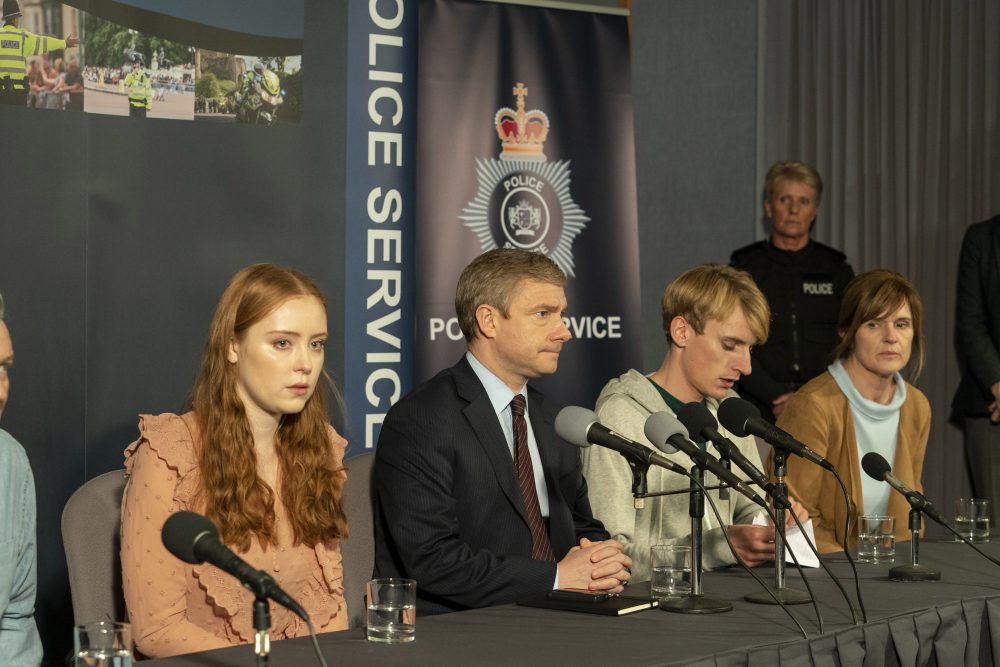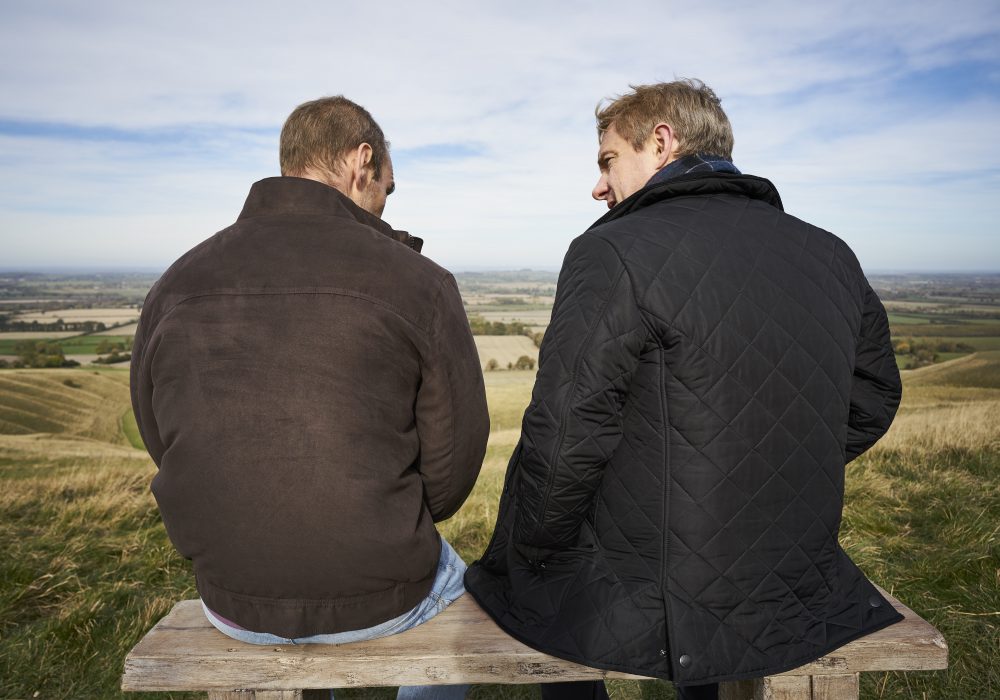If you spend any time binge-watching comfort films or TV shows during your coronavirus lockdown, you’re sure to come across Martin Freeman at some point.

The prolific British actor has appeared in many fan-favourite shows and movies over the last two decades, from big-budget blockbusters such as The Hobbit and Black Panther, to more comedic turns such as “that naked guy” in Love Actually and Tim Canterbury in the U.K. version of The Office.
And while some might know him as Bilbo Baggins from The Hobbit, many others will recognize him as Watson to Benedict Cumberbatch’s Holmes in Sherlock, the acclaimed British series.
His latest project, however, is a detective tale of a completely different sort.
Freeman stars alongside Imelda Staunton and Siobhan Finneran in BritBox Canada‘s new show A Confession, a limited drama series based on a real U.K. police case that captured the country’s attention. The show debuts on May 12.
Freeman stars in the show as Det.-Supt. Steve Fulcher, a top police investigator willing to bend the rules in search of a missing young woman. The show follows Fulcher and his officers as they narrow in on a suspect, only to have the case blow up their faces once the suspect makes a startling confession. Fulcher eventually finds himself caught between pursuing a known serial killer and following the rules, in a case that would ultimately cost him his job.
Martin Freeman spoke with Global News over the phone to discuss the role from his home in the U.K., where he’s been riding out the COVID-19 lockdowns like everyone else in the world.
Global News: The whole world seems to be in lockdown now. How are you handling it?
Martin Freeman: I’m at home reading scripts, reading books, catching up on TV and films. Doing normal family stuff. I mean, same as everyone else, really. I have a job where I don’t work from home, but I’m trying to work as much as possible doing meetings and interviews. So I’m getting used to being locked up in my kitchen.
GN: Everyone deals with boredom in different ways. Is there an essential item that helps you do it?
MF: I’ve got a house full of books and music, and I’m glad the television’s been invented. I’m very lucky. I’ve got food, I’ve got shelter, I’ve got a garden. So while acknowledging this is a very serious, painful time for some people, for me I’ve just got to not go mad. And I’m not. My own company and my kids’ company is alright.

Get daily National news
GN: Let’s talk about A Confession. It’s based on a real case and you play a real police officer with a tragic arc. How did you approach this role, especially knowing that it was based on real events?
MF: I was interested in the case and by the angle of a policeman who, as far as he was concerned, had absolutely just tried to do the best job that he could, and ended up paying a price for it.
GN: How did you prepare for the role?
MF: I read Steve Fulcher’s book, Catching a Serial Killer. I looked at documentaries, I pored over every bit of footage. I met Steve a few times over the course of filming. I found him to be a really smart, thoughtful, admirable man who’s been through more than most of us in terms of losing his position and losing his livelihood, essentially.
I thought it would be an interesting tale. I read it — and people watched it — in a kind of disbelief over what was happening to him, given that as far as any layman is concerned, he had done nothing wrong and he was asked to pay a very high price.
GN: The show pivots around that moment in the title, the confession. Fulcher takes the suspect aside and the suspect tells him everything, before he’s been officially booked and arrested. How did you approach those pivotal scenes?
MF: The whole confession in question really hinges on the murderer saying to the policeman: “Do you want another one?” Meaning, “Do you want another body?” That’s something that happens, I imagine, pretty rarely in a police officer’s life.
He finds himself going through a sort of Alice in Wonderland-type scenario where this guy, of his own volition, is offering up another body of a young woman, and the officer can’t quite believe it but he has to follow it through. And we see what happens, because of the way he did it, he loses his job.
GN: Canadian audiences might not be familiar with this case, but many of them have probably seen you play an investigator in Sherlock. What sets this show apart from Sherlock? Were there any elements you learned in that show that you were able to bring into A Confession?
MF: No. There are not. What sets the show apart from Sherlock is they’re literally nothing alike, except that I’m in it. It’s a lot less dramatic than Sherlock, I suppose. The drama is real and it’s nothing like it.
GN: You’ve been a part of so many different franchises that have a lot of passionate fans. Those fans can have some pretty strong feelings and expectations about what you do. How do you engage with that double-edged sword of fandom?
MF: I try not to engage with it at all, really. I acknowledge that some people like what I’ve done and there are lots of things they didn’t. But beyond that, I don’t feel I need to engage with it any more than that. I’m just an actor.
People are expecting to see a bit of John Watson, and then a bit of Bilbo Baggins, and they’re allowed to want that. But that’s not my concern.
I think as soon as you start putting the cart before the horse and trying to please people, that’s a slippery slope. That’s the thing about not being on social media. I don’t really need to know what every single person thinks of what I do. I’m shielded from that.
GN: Speaking of fanbases, you’re part of the Marvel Cinematic Universe as Everett K. Ross. You were in Black Panther and you’re listed as being in Black Panther 2. Where are things at with that, especially with Hollywood in this coronavirus freeze?
MF: I have no idea when they’re going to be back. It’s slated to happen next year but I don’t know. I just know that I’m in it. I’m as in the dark as you are.
—
You can watch ‘A Confession’ on BritBox Canada beginning May 12.










Comments